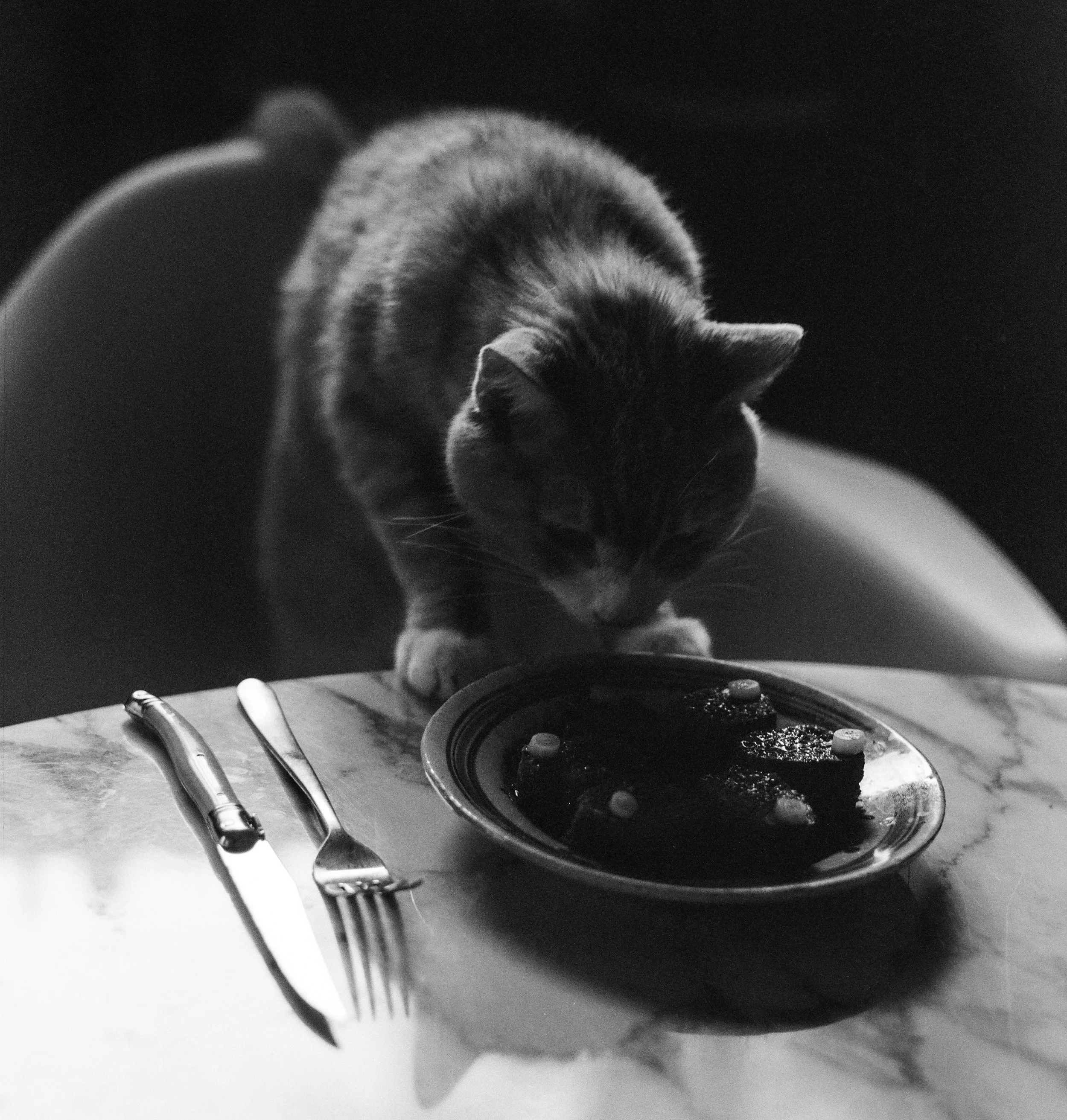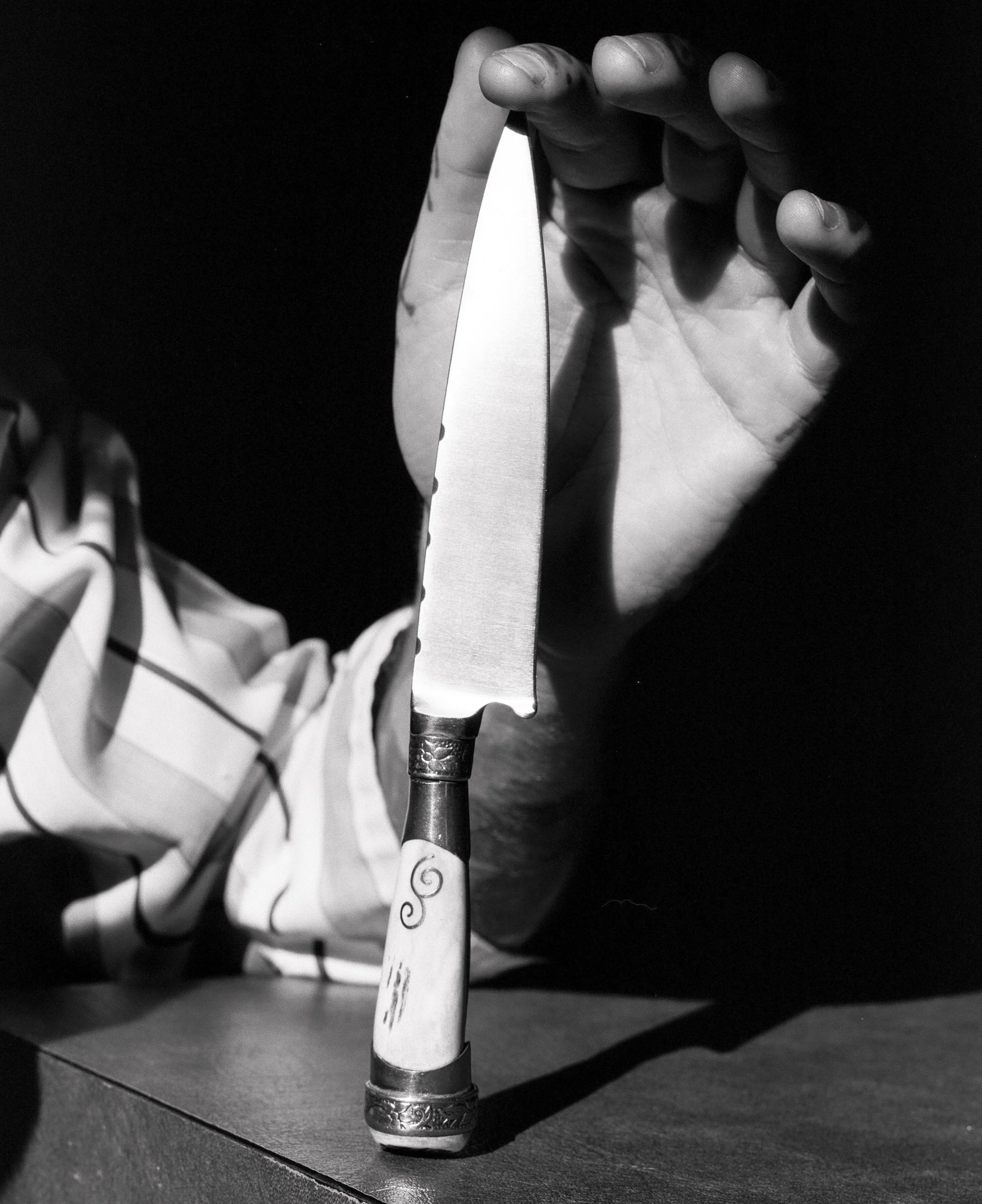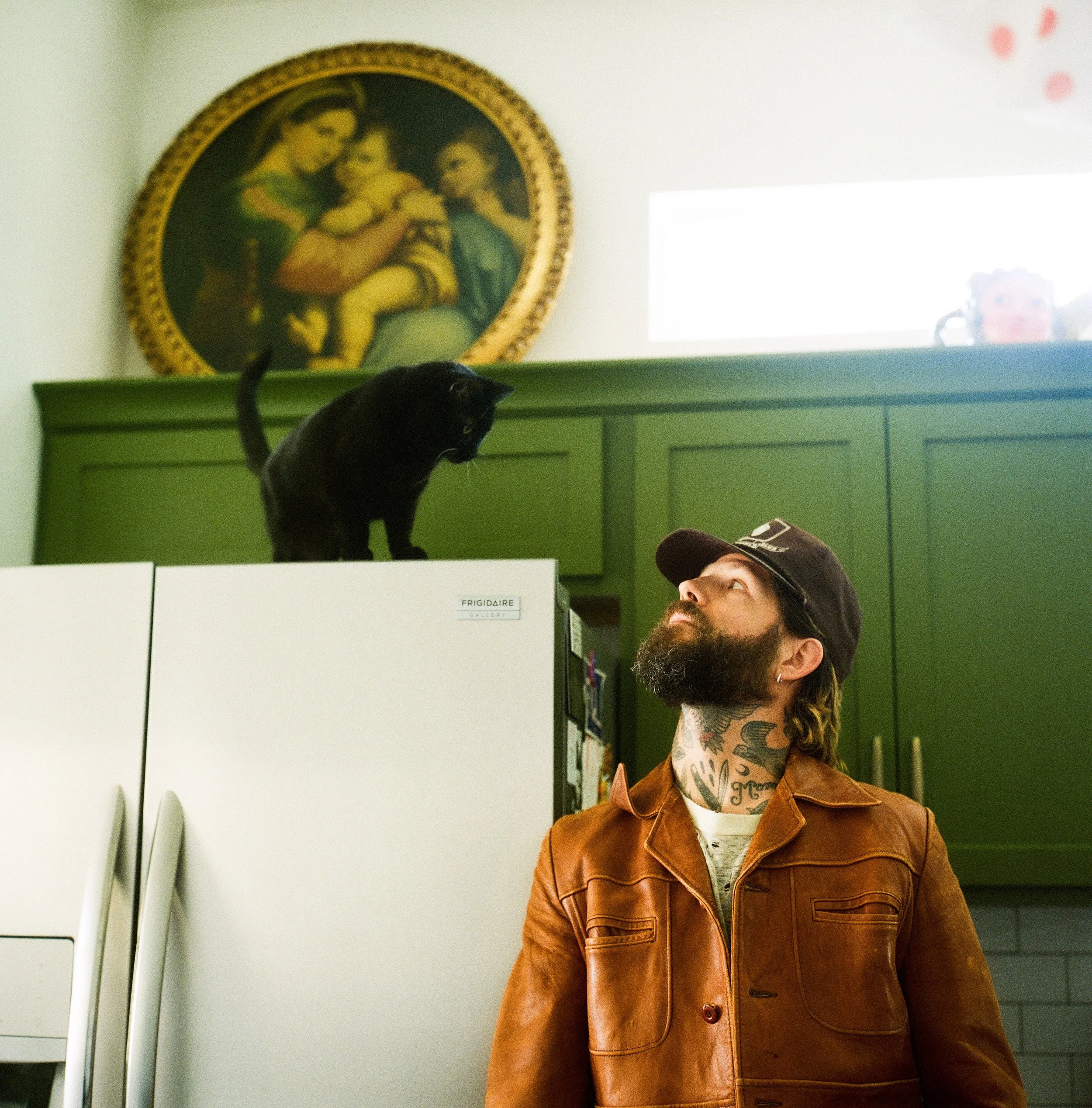
JAKE HOWELL
“The world constantly asks us to do what other people want. But I think you do yourself a disservice if you’re just trying to satisfy someone else’s expectations. If the work is good, people should connect with it. And if they don’t?
Maybe the idea was still right.”
— Jake Howell
COOKING FOR JASON
Video - David Katzinger | Editing - Kathleen Howes
WORDs BY LEMON | IMAGES BY DAVID KATZINGER
People lose their minds over Jake Howell’s food— they take one bite, forget they have jobs, responsibilities, and kids to pick up from school.
He’s more than a chef. He’s an artist, an athlete, a performer—pick your moniker. The point is, he’s not just making food. He’s bending your reality. I don’t pretend to understand all the complexities of his ingredients, but listening to Jake makes you desperately want to eat something he has touched.
There’s no big performance, no theatrics—just focus, precision, and a sense that he was always meant to be doing exactly this. He didn’t set out to be a chef, but anyone who’s seen him in a kitchen would find that hard to believe. He gave a silent masterclass on gravy at my family’s Thanksgiving once and I’ll never forget the look on my Mom’s face when he squeezed a lemon into the saucepan.
Now the chef and co-owner of the acclaimed restaurant Peninsula, Jake has created a space that’s sharp, honest, and deeply his. We sat down to talk about childhood jobs, creative burnout, lemon pepper omelets, and why he thinks the most rational thing about being a chef might also be the most insane.
Lemon: Let’s talk about young Jake.
Jake Howell: I wanted to be a baseball player… or I was told that’s what I wanted to be, so I just went with it. Young me was kind of a menace, though. My mom always jokes that she dressed me until I was two, and then one day I was like, “I’m not wearing that.” After that, it was cowboy boots, Levi’s—my own choices.
This was in Idaho, so, you know… it tracked. When you grow up in a small town, sometimes you just follow the thing that’s right in front of you. You don’t always know you have a choice.
L: Were you someone who worked a lot growing up?
JH: Yeah, always. My mom was a single mom for a lot of my childhood, and I was the kind of kid who wanted things—like not just a BMX bike, but the sickest possible BMX bike. So I figured I’d just make money and get it myself.
I started working for my grandpa’s logging company when I was about nine. It wasn’t official or anything—and it was definitely very illegal. I was a literal child—but I’d clean trucks, move wood, do whatever small tasks they’d let me do.
It’s funny because he had started logging when he was like ten. His parents kicked him out of the cabin, and he moved in with some adult logger and just started working. That was normal at the time, I guess? Didn’t seem that weird.
I also worked summers in a salad dressing factory—putting on lids and boxing. I ate a ton of Caesar dressing.
L: So how did “chef” become your job?
JH: It was more of a happy accident than some grand plan. I was always a curious kid—I liked figuring things out. And I cooked a lot, but more as a hobby than anything intentional. It wasn’t like, “I’m practicing to be a chef.” It was just: people are gonna eat, and I liked the process of coming up with stuff.
L: Were you cooking for yourself or for other people? And were you experimenting or sticking to the same things?
JH: I cooked for other people sometimes—usually my family—but it wasn’t really about that. It was more like I’d get really curious about something and want to try it. I had a big breakfast phase—a lot of omelets.
Not just regular omelets either. Honestly, the worst thing I’ve ever cooked to this day came out of that phase: the lemon pepper omelet. So gross. My mom still reminds me how bad it was—everyone suffered through that phase.
I’d take these packaged udon noodles, break them up, and cover them in lemon pepper because it had that citric acid thing going on—kind of hit the same way as those ramen flavor packets. I guess I just overestimated lemon pepper’s versatility.
The irony is, after all that, all I want now is a plain omelet.
L: Do you remember a time when you made something and thought, “Wait, this is actually good?”
JH: Not really. I don’t think I ever had that kind of “aha” moment. It wasn’t like that. I just liked making stuff.
It wasn’t an intellectual curiosity or part of some bigger plan—I was just a kid being curious the way kids are. I liked to draw and paint too, and cooking was kind of the same—it was just another thing to make.
My mom’s a gardener, so we had all this fresh stuff around and I’d grab things and throw them into food and see what happened.
L: So how do you go from working random jobs as a kid to deciding to become a chef?
JH: I basically cooked until I decided I was gonna not cook. I wanted to try doing more creative stuff—things outside the kitchen. And I did that for a while, like a couple years. It was good. I think I needed the space.
But as time went on, I realized there was something about cooking I actually missed.
It wasn’t just a job. When I cooked, I genuinely enjoyed it—I just hadn’t thought about it as a real career path. Even when I wasn’t trying to “be a chef,” I still took it seriously. I didn’t want to suck at it. I stayed curious, and I think I kind of accidentally ended up with some skills.
I was around 25 or 26 when I decided I was gonna go back to the kitchen. But if I was gonna do it, I had to fully commit. Like, all the way. I had this feeling that maybe cooking was actually the outlet I’d been looking for—the place where I could put the creative part of my brain to work in a way that felt tangible. So I went all in.
Three and a half years later, I was opening Peninsula.
L: What was going on in your life at that point?
JH: I was just failing the way young people fail—couldn’t get my priorities straight, making bad decisions, chasing the wrong things, trying to be a “creative” in a city that’s hard. I was also just being irrational and assuming I should be more successful than I was.
By 25, I remember thinking, I’ve completely wasted the last seven years of my life. Like I’d already blown it.
L: Do you think the way you relate to your work has changed as you’ve gotten older?
JH: I think when you’re in your 20s, there’s this constant suffering—trying to be good, trying to feel accomplished, trying to be happy with what you’re making. And I thought that would eventually go away. But in my 30s, I’ve realized I’m going to feel like this forever.
It’s just the nature of wanting your work to be better—there’s always going to be some kind of suffering in that. The difference is doing it in a way that doesn’t make you miserable.
There’s a big difference between suffering through wanting more and accepting that it’s part of who you are—and being happy anyway while you keep trying to get better.
Because “more” isn’t really coming. There’s not going to be a point where I’m like, cool, I’m good, I’m done. I’m not crazy enough to believe that anymore.
L: What’s your most irrational food opinion?
JH: I think caviar bumps are the most cringey thing in the world. I’ve felt that way since the first time I saw one. And it’s not just, like, obnoxious people doing them—even cool people do them. That’s what makes it worse. It’s somewhere between a “shambong” and some esoteric foodie ritual, and every time I see it—I recoil. I don’t know if I hate it. Actually, no—I do. I hate it.
L: Do you think people are born with taste, or is it something they develop?
JH: I think it’s both. People are probably born with a baseline sense of what they like—something that's just theirs, tied to how they see the world. But it also evolves. It’s like that nature vs. nurture thing: how much of who you are is innate, and how much of it is what you’re exposed to?
Taste is tricky, though, because it’s so personal. I only know my own. I know what I like and what I think is good or bad—but there’s no universal definition. It’s subjective by nature, and I kind of like that about it.
L: How would you describe your taste at home—your style?
JH: Mostly functional. I want to be comfortable and I want things to work, but I also want to like looking at them. That’s the balance I’m always trying to find.
Honestly, I just end up moving stuff around endlessly because I’m never totally satisfied with how anything looks. I’d say my home aesthetic is personal, not performative. I don’t care about it looking like something—it just has to feel like mine.
L: Why do you love coming home?
JH: It’s the one space I can really control.
The world is chaotic and unpredictable, but at home, I get to decide how things are. I can’t tell the world how to be, but I can create a little comfortable place here. So coming home feels like a rest from the rest of the world. And my cats, Marc and Sofi—but not in that order.
L: What does being a cat person say about you?
JH: I don’t know—maybe nothing, maybe everything? People always say cats are low-maintenance and don’t care about you, which I think is bullshit. They’re amazing companions. They're comforting and affectionate in their own way. I like animals and it's nice to reciprocate, to love other things. There’s something nice about giving an animal a home—like maybe their life would’ve been harder without you.
L: What’s something people assume about you that’s totally wrong?
JH: That I’m an asshole. I get it, kind of—I’m from the inland Northwest, my grandma’s Swedish, and there’s this really direct, no-frills way of communicating that can come off as cold if you’re not used to it. Or maybe I just look crabby.
L: Do you have an ingredient you trust the least?
JH: Guava. I’ve gone back to that one so many times thinking I’ll finally crack it, and every time I’m like... nope, still doesn’t land. But I think there’s something useful in pushing yourself to work with things you don’t love. You end up learning something either way.
L: What does that process look like for you now—testing something new, figuring it out?
JH: It’s changed a lot over time. When I was less experienced, it was just endless failure and experimentation—throwing things at the wall. I didn’t have the context or the instincts yet, so it took way longer to get anywhere.
Now it’s more efficient. I can think through ideas more clearly, because I’ve built this mental framework over time. I can anticipate what might work or what probably won’t, and I use a lot less brain space to get somewhere good.
L: Do you cook for yourself or for other people?
JH: I think the intention is always to cook for other people—but I can’t create by trying to guess what people want. That’s a dead end.
So in a way, I’m cooking for myself—making something that resonates with me—and hoping it translates. If it connects with someone else, that’s the best outcome. But even if it doesn’t, that doesn’t mean the idea was wrong.
The world constantly asks us to do what other people want. But I think you do yourself a disservice if you’re just trying to satisfy someone else’s expectations. If the work is good, people should connect with it. And if they don’t? Maybe the idea was still right.
L: How many food tattoos do you have?
JH: None. Which is probably surprising considering how many I have.
I don’t have anything against food tattoos, they’re just not for me. It’s like certain clothes—I can respect the look, I just wouldn’t wear it.
That said, we do have this running joke in the kitchen where we yell “Yeehaw” when things get busy, and a bunch of us got “Yeehaw” tattoos. But they’re in old English and kind of small, so now it looks like it says “Pee Ham.” So yeah—I have a Pee Ham tattoo. No food tattoos, just PeeHam.
L: If there ever comes a day when cooking stops doing it for you—what do you think you'd be doing instead?
JH: My long-term goal is to cook forever. It’s the thing I love most, so ideally, I’d stay in the kitchen in some capacity—even if I’m old. But I think at some point, there will be other things I’ll want to do, other ways I’ll want to spend my time.
I’d love to start a mentorship program—something like culinary school, but free. The cost of culinary school is insanely prohibitive, and one of the parts of my job I’ve always loved is teaching and mentoring. I think that would be a worthwhile way to give back later in life.
I’ll probably go fly fishing a lot. Maybe coach a high school baseball team. I’d like to make art again. As long as I’m creating something, staying engaged, and having an impact, I’ll be happy. The worst-case scenario for me is feeling done. I like goals. I like objectives. I’d rather chase something than just float through the last years of my life.
L: Do you think cooking makes people better at life?
JH: I think working in a kitchen—especially at a high level—teaches you structure, accountability, and how to actually follow through. You can’t fake it. The work is either good or bad, and it’s right there in front of you.
So yeah, I think you pick up life skills doing this job. But being good at life also means being happy and fulfilled. And sometimes cooking gives you that. Sometimes it doesn’t.
L: What advice would you give someone who really wants to be a chef?
JH: Go work in a kitchen for six months before you commit. That’s the simplest advice I can give. If you’re cool with missing weddings and working every Saturday night
—if you’re okay with your life being tied directly to your work—then maybe it’s for you.
There is no work from home. There's no work on vacation. There's no “I’m in California, but I'm working.” You're either working or you're not.
That kind of commitment isn’t for everyone. And you can do this job and be fine at it, but I don’t think you’ll go very far if you’re not fully in. It’s not an industry that rewards half-measures.
L: What’s your go-to fast food order?
JH: Honestly, a plain McDonald’s hash brown. That’s probably my number one—just always good. Or an animal-style burger. Those are the guarantees.
L: Is there someone—dead or alive—you dream of cooking with or having in your kitchen?
JH: This is gonna sound cheesy, but I wish I could’ve cooked for my grandpa. He’s not alive anymore, but I think it would’ve been really fun—and honestly, hilarious.
I don’t think he ever fully understood what I do. Like, not even a little bit. So the idea of him coming to the restaurant and seeing me in that context… would be great.
L: What’s your death row meal? No rules.
JH: Okay, so I feel like I’d start with a hot dog—mustard only.
For the main, I’d want something comforting. Not complicated. Because, you know, you’re about to get roasted. This is gonna make me sound trashy, but I’d want a cheeseburger. I think a cheeseburger is an almost perfect food.
Dessert: vanilla soft serve. Easy. And I think I’d want a Dr. Pepper. Fountain, of course.
Hot dog, cheeseburger, soft serve, Dr. Pepper. That’s the set. Then I die.
L: If someone could hear a song the moment they took a bite of your food—or walked into your restaurant—what would be playing?
JH: Well, everything we do has a specific intention, so if it were a movie, I’d probably want different songs for different dishes. Like: this one track has to go with that dish. But if I had to pick one song for the whole menu right now? It’d probably be Apollo by Brian Eno. It’s ambient and weird, but not distracting. It kind of floats in the background—which makes sense to me.
There’s a kind of clarity that comes with talking to someone who’s found the right work. For Jake, cooking is less about perfection and more about pursuit—of meaning, of discipline, of creating something that feels like him. He’ll be the first to tell you he doesn’t have it all figured out. But it’s clear he’s found his place. He believes in doing things for the right reasons. And honestly? It works.
This month, Jake heads to Chicago as a James Beard Award finalist. And this Fall, he’ll open two new concepts—a restaurant and a separate bar—at the Neuhoff development in Germantown.








